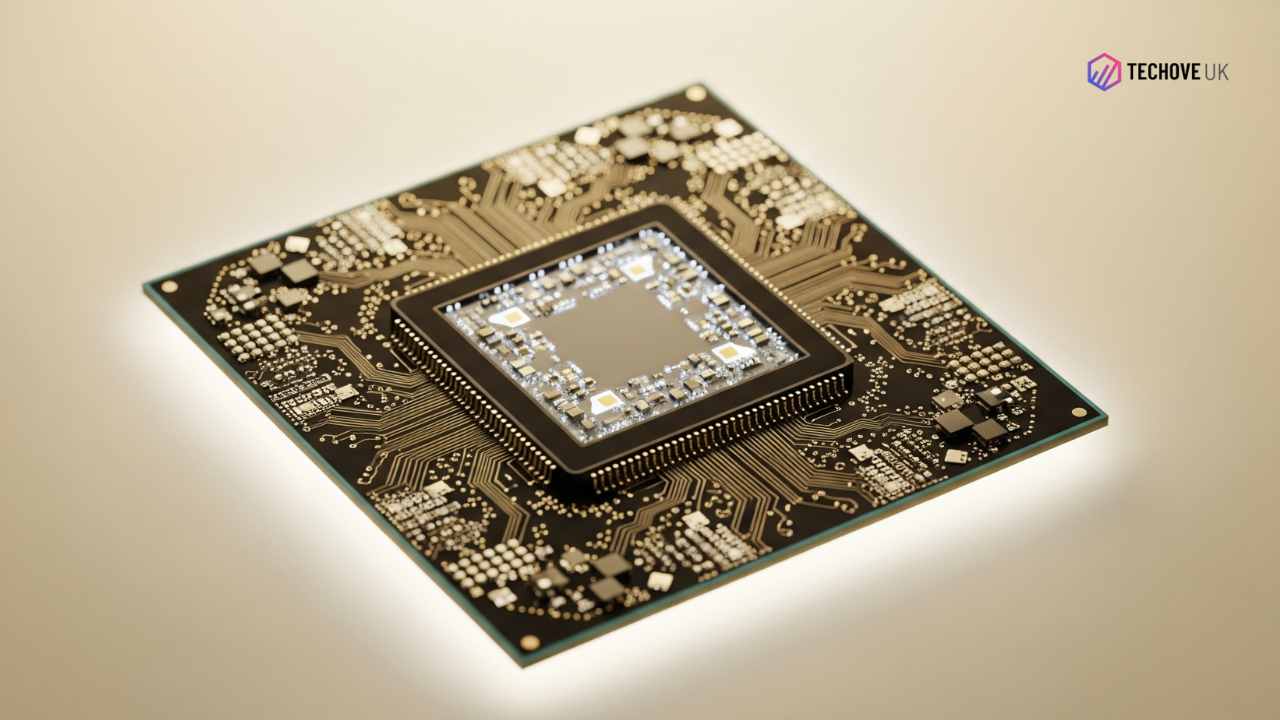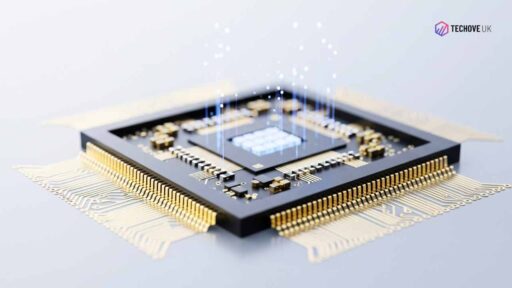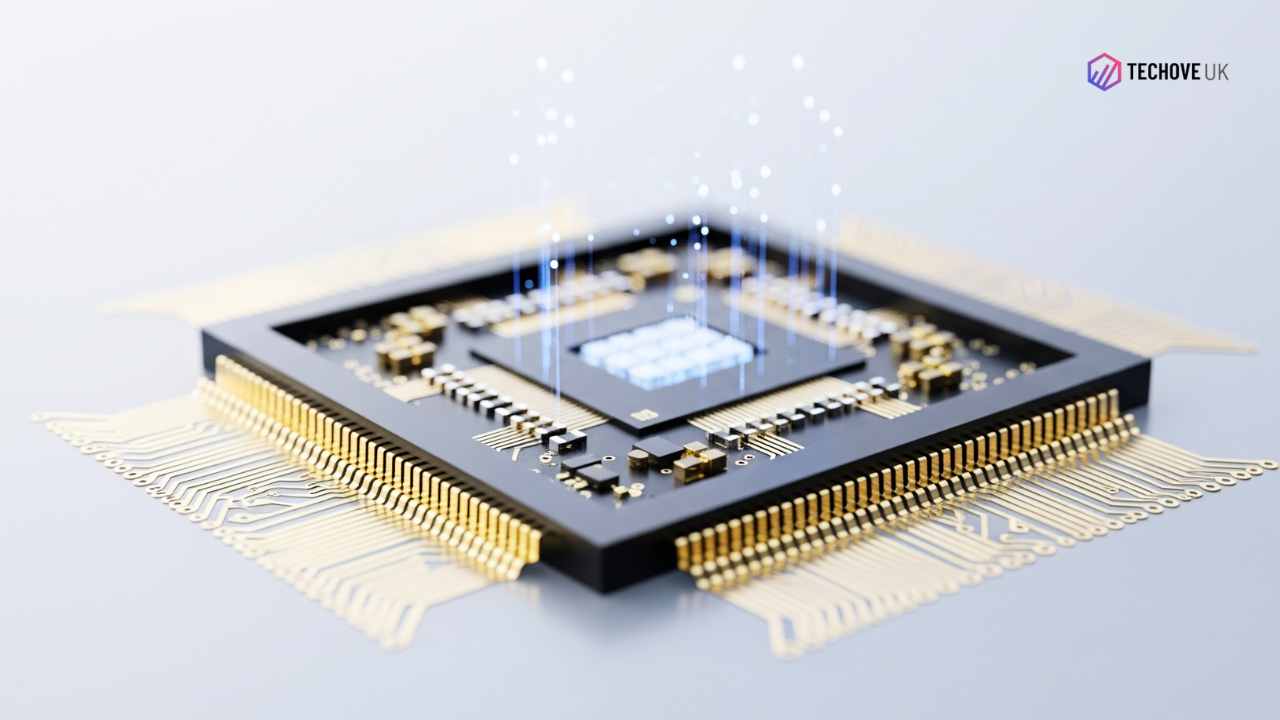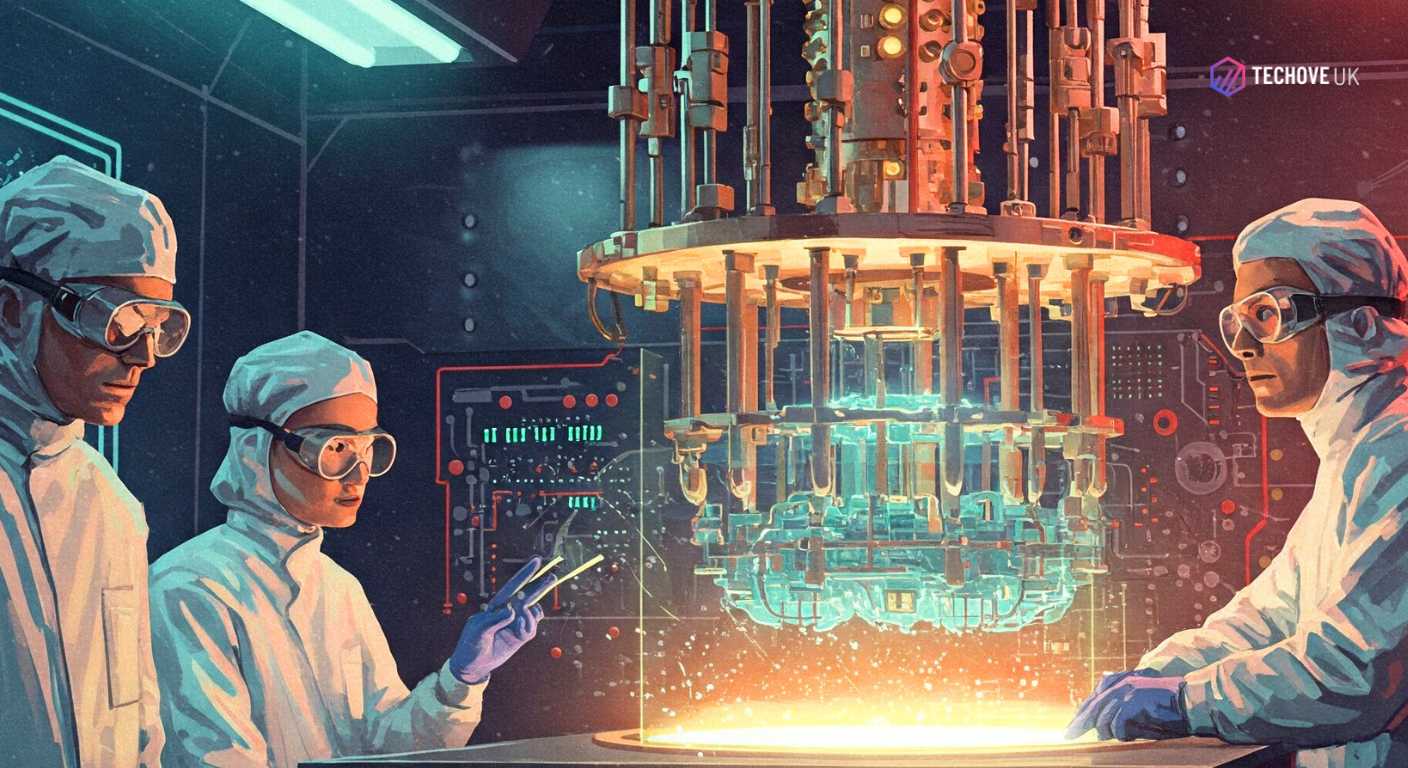Have you ever stopped to think about how is a new kind of chip for quantum technology? Inside every smart device, there’s a tiny but powerful brain called a chip. For years, we’ve made these chips better and faster. But what if we’re reaching the limit of what normal chips can do? What if we need a completely new kind of chip to solve the world’s biggest problems?
Get ready, because that new kind of chip is here. It’s called a quantum chip, and it’s not just a small step forward, it’s a giant leap into a new world of technology. Right here in the UK, brilliant scientists and engineers are working on this amazing new technology.
Let’s dive in and explore how a new kind of chip for quantum technology is being born.
What Chip is Used in Quantum Computing?

The chip in your laptop uses something called a “bit.” A bit is super simple. It’s like a light switch. It can only be ON or OFF. That’s it. In computer language, we call this a 1 (ON) or a 0 (OFF).
A quantum chip uses something much more special, called a qubit (pronounced CUE-bit).
So, what’s a qubit? Imagine a spinning coin. Before it lands, is it heads or tails? It’s kind of both at the same time, right? A qubit is just like that spinning coin. It can be a 1, a 0, or both at the very same time!
This amazing ability to be in multiple states at once is a real superpower called superposition. It’s this superpower that lets a quantum computer check millions of possibilities all at once, instead of one by one like a normal computer. It’s the difference between trying to find a single grain of sand on a huge beach by yourself, versus having a million helpers searching with you at the same time.
How is a Quantum Chip Made?
You can’t make a quantum chip in your garage. It takes some of the cleanest, coldest, and quietest places on Earth. Even a tiny piece of dust or a small vibration could ruin the whole thing. The process is a true marvel of science.
Scientists are trying a few different “recipes” to make the best quantum chips. Here are the most popular ones:
Super-Cold Circuits: Imagine tiny racetracks for electricity. Companies like Google and IBM make their chips out of special metals that, when they get colder than outer space, let electricity flow with zero resistance. They are called superconductors. These super-cold circuits become the qubits.
Trapped Atoms (Ions): This sounds like something from a superhero movie! Scientists use powerful lasers as “tweezers” to hold a single atom perfectly still. By shining other lasers on this trapped atom, they can control it and turn it into a perfect qubit. A brilliant UK company called Universal Quantum is a world leader in this method.
Chips Made of Light (Photonics): What if you could compute with light itself? Some companies, like Aegiq in Sheffield, are building chips that guide tiny particles of light, called photons, through mini-mazes. Each photon can act as a qubit. A big plus for this method is that it might not need to be kept super-cold, making it much easier to use.
Tiny Crystals (Quantum Dots): These are man-made crystals so small they are called “artificial atoms.” Scientists can trap a single electron inside one and use its energy to represent a qubit.
No matter the recipe, the goal is the same: create a perfect, controllable qubit that can hold onto its quantum superpower for as long as possible.
👉🏻Related Post: What Will Be The Future Of Quantum Mechanics? Proven Bits
Who is Making These Quantum Chips?
The race to build a useful quantum computer is on, and the UK is a real contender on the world stage. The British government has invested over £1 billion into a national program to support this technology, helping create a buzzing community of innovators.
Top Quantum Players in the UK:
Universal Quantum: Based in Sussex, they are experts in the “trapped ion” method. They have figured out a clever way to make their quantum chips connect to each other, like Lego bricks. This is a huge step towards building a truly massive and powerful quantum computer.
Aegiq: This Sheffield-based company is a star in the world of photonic quantum computing. They are focused on creating chips that use light, which could unlock the door to quantum computers that work at room temperature.
ORCA Computing: Working out of London, ORCA is another key company using photons. They have found smart ways to build quantum memories, which are needed to store quantum information.
Oxford Quantum Circuits (OQC): This Oxford University spin-out built the UK’s first commercially available quantum computer. They are making their powerful superconducting quantum chips available to businesses through the cloud.
And Around the World:
Of course, the UK isn’t alone. Giant tech companies are also in the race, pushing the limits of what’s possible.
- Google: Their Quantum AI lab is world-famous. They have built powerful chips and are a major force driving the technology forward.
- IBM: A pioneer in computing for decades, IBM offers many different quantum computers that people can access and use over the internet to learn and experiment.
- Microsoft: They are trying a very different and ambitious approach, working on something called a “topological qubit,” which they hope will be naturally protected from errors.
How is a Quantum Chip Different from a Normal Chip?
The best way to understand the difference is to compare them side-by-side. Think of a normal chip as a very fast and reliable calculator. A quantum chip is more like a creative genius that can see all the answers at once.
Another quantum superpower we need to talk about is entanglement. It’s one of the strangest but most powerful ideas in all of science.
Imagine you have two “linked” qubits. If you look at one and see it’s a “1,” you instantly know the other one is also a “1,” even if it’s miles away! Albert Einstein called this “spooky action at a distance.” This magical link allows qubits to work together as a powerful team, sharing information in a way that normal bits never could.
How Expensive is a Quantum Chip?
You won’t find a quantum chip on Amazon anytime soon! A single, high-quality experimental chip can cost tens of thousands of pounds. But that’s like asking how much an F1 car’s engine costs. The engine is just one part of a much bigger machine.
A working quantum computer is a giant, complex system. The chip is the brain, but it needs a huge life-support system around it. This includes:
- A Giant Fridge: The most common quantum chips need to be kept colder than deep space. The refrigerators to do this are huge, multi-million-pound machines.
- Laser and Microwave Systems: A room full of high-tech gear is needed to send tiny, precise signals to control and read the qubits.
- A Normal Computer: You still need a regular computer to tell the quantum computer what to do and to understand the answers it gives.
All in all, building and running a powerful quantum computer today can cost tens of millions of pounds. That’s why they are currently only found at big companies, universities, and national labs.
Is Google’s Quantum Chip Real?
Yes, it is very real! In 2019, Google announced something that shook the world of science. They claimed they had achieved “quantum supremacy.”
What does that mean? It means their quantum chip, named Sycamore, did something that no normal computer could. It solved a very specific, weird math problem in just 200 seconds. Google calculated that it would have taken the world’s most powerful supercomputer at the time about 10,000 years to do the same task.
Think about that! 200 seconds versus 10,000 years.
While some competitors argued about the exact numbers, it was a historic moment. It was like the first time an airplane flew. It might not have gone very far, but it proved that flight was possible. Google proved that quantum computers could, for certain problems, be mind-bogglingly faster than anything else on Earth.
Since then, Google has built even better chips, like its new Willow chip. This chip is designed to tackle the biggest enemy of quantum computing: errors. Because qubits are so delicate, they can easily make mistakes. Willow is showing that it can help spot and fix these errors, which is a huge step toward building a truly useful machine.
Who Invented the Quantum Chip?
The idea of a quantum computer wasn’t born in a big tech lab. It came from the mind of a famous physicist named Richard Feynman back in the 1980s. He realized that nature follows the strange rules of quantum mechanics, so to understand nature, we should build a computer that does the same. It was a revolutionary idea.
But an idea is one thing; building it is another. The journey from dream to reality took many smart people. A huge moment came in 1998. A team of scientists, including Isaac Chuang from MIT and others from top universities, created the world’s first working 2-qubit quantum computer. It was tiny and simple, but it worked. It could be loaded with a problem, and it could spit out the right answer. This experiment proved that Feynman’s dream could become a reality.
Who Makes the Most Powerful AI Chip?
You hear a lot about Artificial Intelligence (AI) today, from ChatGPT to self-driving cars. Does AI run on quantum chips?
Not yet. For now, the king of AI chips is a different kind of processor called a Graphics Processing Unit, or GPU. And the company that rules the world of GPUs is Nvidia.
GPUs were first designed to make video game graphics look amazing. It turns out that the type of math needed for great graphics is also perfect for training AI. GPUs can do thousands of simple tasks all at the same time, which is exactly what AI needs to learn from huge amounts of data.
So, for now, think of them as different tools for different jobs:
- GPU: The perfect tool for today’s AI.
- QPU (Quantum Chip): The perfect tool for solving giant puzzles in science and medicine.
In the future, these two powerful chips might work together. An AI running on a GPU could help us design better quantum chips, and a quantum computer could help us create a whole new kind of super-intelligent AI.
Conclusion: How is a New Kind Of Chip For Quantum Technology?
The journey into quantum technology is one of the most exciting adventures in human history. How a new kind of chip for quantum technology is being made is a story of incredible creativity, precision, and imagination. It’s happening in super-cold labs, with laser beams and trapped atoms, and it’s pushing the boundaries of what we thought was possible.
Here in the UK, we are not just watching this revolution unfold; we are leading parts of it. From brilliant university spin-outs to major national research centres, the UK is a fantastic place to be for quantum innovation.
We’ve learned that quantum chips are not just faster versions of old chips—they are something new entirely. They use the magic of qubits, superposition, and entanglement to see the world in a completely different way. They are expensive and delicate today, but they hold the promise of solving problems that are completely out of reach for even the best supercomputers.
They could help us discover life-saving drugs, create amazing new materials, build a cleaner energy future, and unlock secrets of the universe we haven’t even thought to ask about.
The age of quantum computing is just beginning. As we stand here at the dawn of this new era, there’s one thrilling question to ask ourselves: If you had the power of a quantum computer, what amazing problem would you choose to solve first?





